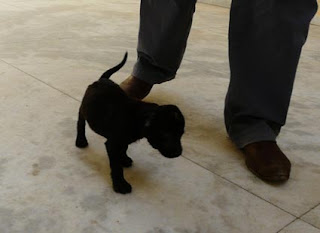 Not long ago, while I was staying in Jaipur I heard that we had a new dog and her puppy in Laporiya. After a previously unsuccessful attempt to convince my boss that a new puppy was just what we needed, I was surprised at this new development, but elated.
Not long ago, while I was staying in Jaipur I heard that we had a new dog and her puppy in Laporiya. After a previously unsuccessful attempt to convince my boss that a new puppy was just what we needed, I was surprised at this new development, but elated.When I first met Solanka and her unnamed 5 day old daughter they were tied up near where the tractors are kept looking scared and intimidated. The next morning I went searching for the puppy only to impale a spike from a tractor accessory into my little toe causing enough blood loss for me to be worried, and my first public tears in front of my Indian family. My boss came to the rescue and patched me up using a combination of whiskey, TCP and my VSO first aid kit. I tracked down the puppy soon after, only for it to be taken away the following day to live at our training centre 11 kms away.
 So we're left with the lovely Solanka. She's been living here a week or so and is no longer tied up and has moved into the main courtyard where most of the family interaction takes place. I've taught her how to play fetch and have been making sure she's got enough water. What marks her out is her sweet natured character, so different to the other dogs in the house who become hardened and fend for themselves apart from being given roti and milk twice a day. Although our three dogs may be pets, come to India with the pet dog mentality of England and you'd be in trouble. It's only recently I've learnt exactly what the perimeters are- no petting dogs, dogs are not allowed inside any rooms, dogs are not walked, do not touch the dog bowl, instead take roti to the dog bowl and drop inside, if you have to touch the dog wash your hands straight away with soap, dogs are not allowed near the washing up area. Any dogs disobeying these rules are shouted at and even hit with a stick (Grandma is chief discipliner). With Solanka I try to ride the middle ground, petting her but always washing my hands in full view of the family.
So we're left with the lovely Solanka. She's been living here a week or so and is no longer tied up and has moved into the main courtyard where most of the family interaction takes place. I've taught her how to play fetch and have been making sure she's got enough water. What marks her out is her sweet natured character, so different to the other dogs in the house who become hardened and fend for themselves apart from being given roti and milk twice a day. Although our three dogs may be pets, come to India with the pet dog mentality of England and you'd be in trouble. It's only recently I've learnt exactly what the perimeters are- no petting dogs, dogs are not allowed inside any rooms, dogs are not walked, do not touch the dog bowl, instead take roti to the dog bowl and drop inside, if you have to touch the dog wash your hands straight away with soap, dogs are not allowed near the washing up area. Any dogs disobeying these rules are shouted at and even hit with a stick (Grandma is chief discipliner). With Solanka I try to ride the middle ground, petting her but always washing my hands in full view of the family.In India stray dogs roam the streets of every city, town and village. Human inhabitation attracts them, but people do keep pet dogs here. In Delhi particularly, take a walk in any park and you'll see well fed pet dogs wearing collars being walked, often Western breeds like retrievers and labradors. When I go for a run in Laporiya, which I'm ashamed to say I seldom do nowadays, I keep an eye on where the nearest sticks are, just in case a rabid dog approaches me. They are so used to being hit by villagers that if you even raise a stick they run. There have been no known recoveries from rabies, so if you're bitten you have to get to the hospital pronto. My Indian cousin was walking through the village to a wedding one evening and stepped on a sleeping dog by mistake. It proceeded to bite him and he was taken to the nearest hospital in the morning.
The oldest of our pet dogs is a boy called Sheru, which means lion in Hindi. Coincidently that's also the name of the older dog at our training centre. In fact in turns out Sheru in a very popular dog's name in India, which led me to ask the question, "But what happens if you lose your dog and everyone else is calling Sheru too". It didn't seem to be a problem in India.
So back to Solanka, who greets me every morning by raising her paw, tries to follow me into the office and supervises while I practice yoga on the roof. At lunchtime while I'm having my nap she'll lie next to my day bed. In her I've found a new friend and a consolation for not having my own jack russell Dotty here.
Looks like you are having a great time! I am in Jaipur today (July 20) and in India until 30 July. Best wishes, Prasun Sonwalkar (UWE)
ReplyDelete